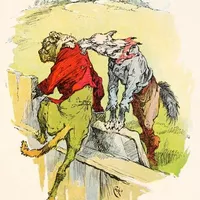The Dog and the Wolf
Der Hund und der Wolf
The Dog and the Wolf
El perro y el lobo
Le chien et le loup
Il cane e il lupo
犬と狼
개와 늑대
Šuo ir vilkas
Pies i wilk
O cão e o lobo
Собака и волк
Köpek ve Kurt
狗与狼
A gaunt Wolf was almost dead with hunger when he happened to meet a House-dog who was passing by.
|émacié||||||la faim||||||||||||
|thin and bony|||||||||chanced upon|||||||||
A gaunt Wolf was almost dead with hunger when he happened to meet a House-dog who was passing by.
Un lobo demacrado estaba casi muerto de hambre cuando se encontró con un perro doméstico que pasaba por allí.
Un loup décharné était presque mort de faim lorsqu'il rencontra par hasard un chien domestique qui passait par là.
Um lobo magro estava quase morto de fome quando encontrou um cão doméstico que ia a passar.
Исхудавший Волк был почти мертв от голода, когда случайно встретил проходившего мимо Домового Пса.
‘Ah, Cousin,' said the Dog.
Ah, primo", dijo el perro.
Ah, primo", disse o Cão.
Ах, кузен, - сказал Пес.
‘I knew how it would be; your irregular life will soon be the ruin of you.
|||||||||||||downfall||
‘I knew how it would be; your irregular life will soon be the ruin of you.
'Sabía cómo sería; tu vida irregular pronto será tu ruina.
Eu sabia como seria; a tua vida irregular em breve será a tua ruína.
Я знал, как это будет; ваша нерегулярная жизнь скоро погубит вас.
Why do you not work steadily as I do, and get your food regularly given to you?'
|||||régulièrement|||||||||||
|||||consistently|||||||||||
¿Por qué no trabajas como yo y te alimentas regularmente?
Pourquoi ne travailles-tu pas régulièrement comme moi, et ne reçois-tu pas ta nourriture régulièrement ?
Porque é que não trabalhas regularmente como eu e não recebes regularmente a tua comida?
Почему ты не работаешь постоянно, как я, и не получаешь регулярно еду?
‘I would have no objection,' said the Wolf, ‘if I could only get a place.'
||||objection||||||||||
||||no problem||||||||||
No tendría inconveniente", dijo el Lobo, "si pudiera conseguir una plaza".
Je n'y verrais pas d'inconvénient, dit le Loup, si seulement je pouvais obtenir une place.
Eu não me oporia", disse o Lobo, "se conseguisse arranjar um lugar".
Я бы не возражал, - сказал Волк, - если бы только смог получить место.
‘I will easily arrange that for you,' said the Dog; ‘come with me to my master and you shall share my work.'
|||set up||||||||||||||the person addressed||take part in||
Te lo arreglaré fácilmente -dijo el Perro-; ven conmigo a ver a mi amo y compartirás mi trabajo".
Viens avec moi chez mon maître et tu partageras mon travail".
Я легко устрою это для тебя, - сказал Пес, - пойдем со мной к моему хозяину, и ты разделишь мою работу".
So the Wolf and the Dog went towards the town together.
So the Wolf and the Dog went towards the town together.
El lobo y el perro se dirigieron juntos hacia la ciudad.
Le Loup et le Chien se dirigèrent donc ensemble vers la ville.
И Волк с Собакой вместе пошли к городу.
On the way there the Wolf noticed that the hair on a certain part of the Dog's neck was very much worn away, so he asked him how that had come about.
|||||||||||||||||||||usée||||||||||
||||||observed|how it happened||||||||||||||Thinned out|||||the Dog|in what way||||
En el camino, el Lobo se dio cuenta de que el pelo de cierta parte del cuello del Perro estaba muy desgastado, así que le preguntó cómo había sucedido.
En chemin, le Loup remarqua que les poils d'une partie du cou du Chien étaient très usés, et il lui demanda comment cela s'était produit.
По дороге Волк заметил, что шерсть на некоторой части шеи Пса сильно облезла, и спросил его, как это произошло.
‘Oh, it is nothing,' said the Dog.
No es nada", dijo el Perro.
Oh, ce n'est rien, dit le chien.
О, это пустяки, - сказал Пес.
‘That is only the place where the collar is put on at night to keep me chained up; it chafes a bit, but one soon gets used to it.'
|||||||collier|||||||||attaché|||frotte|||||||||
|||||||restraint device|||||||||restrained|restrained|||||||||||
'Es sólo el lugar donde me ponen el collar por la noche para mantenerme encadenado; roza un poco, pero uno se acostumbra pronto'.
C'est seulement l'endroit où l'on met le collier la nuit pour me garder enchaîné ; cela irrite un peu, mais on s'y habitue vite.
Это только то место, где на ночь надевают ошейник, чтобы держать меня на цепи; он немного натирает, но скоро к нему привыкаешь".
‘Is that all?' said the Wolf.
¿Eso es todo?", dijo el lobo.
C'est tout ? dit le Loup.
И это все?" - спросил Волк.
‘Then good-bye to you, Master Dog.'
||||Master Dog||
'Entonces adiós a usted, Amo Perro.'
Alors, au revoir à vous, maître chien.
Тогда прощайте, хозяин Пса.
Better starve free than be a fat slave.
|mieux vaut mourir de||||||
|go hungry|unrestricted or independent|rather than|||overweight or obese|oppressed person
Mejor morir de hambre que ser un esclavo gordo.
Mieux vaut mourir de faim que d'être un esclave obèse.
Лучше голодать бесплатно, чем быть жирным рабом.

